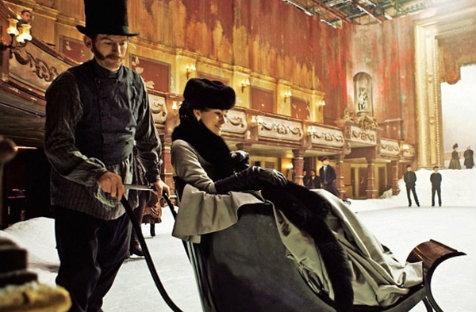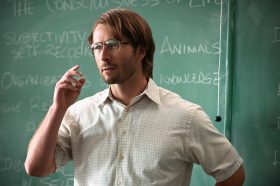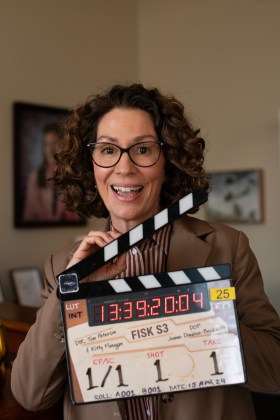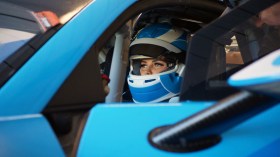In their audacious and ambitious vision of Imperial Russia, the plight of Anna (Keira Knightley, Seeking a Friend for the End of the World) unravels with the histrionics of the text, heightened by the dramatic locale. As the bored but dutiful wife to statesman Alexei Karenin (Jude Law, Rise of the Guardians), Anna’s outlook is transformed by her introduction into Moscow society. Though her attendance stems from a quest to repair her adulterous brother’s (Matthew Macfadyen, The Three Musketeers) marriage, soon the dashing Count Vronsky (Aaron Taylor-Johnson, Savages) monopolises her attention, a shared infatuation which threatens her nuptial vows.
Their elicit courtship swells within the theatre’s walls, along with the scandalous repercussions. Making ample use of its unique framing device, the film carves Anna and Vronsky’s love into public and private components: the spectacle taking place on stage and within the stalls that double as ballrooms and race tracks, intimate moments in the wings and dark corners that stand in for hallways and bedrooms. The technique is elegant in its simplicity, yet effectively conveys the disparity of grand and quiet moments. Such stylisation also embodies the duality of the heroine, the epitome of a woman divided.
Wright further illustrates his mastery of the surroundings in the rhythmic push and pull of the narrative (mirrored in the highly choreographed interactions and scene transitions), the sweeping, swirling cinematography (by The Avengers’ Seamus McGarvey) that captures every nook and cranny of the set, and the sumptuous intricacy of the elaborate costumes and production design. Combined, each meticulously composed shot brings Anna’s story to life in all its appetite and intensity; Dario Marianelli’s (Quartet) immersive score adds an impassioned emphasis.
Anna Karenina thrums with energy and immediacy, and further enlivened by expressive performances and the hum of constant movement. Knightley excels, proving subtle in her emotion and perfectly evoking the character. Her sweet and sour changes demonstrate range not often ascribed to the actress, living up to Wright’s faith in her abilities. Only the tender tale of fellow troubled lovers Kitty (Alicia Vikander, A Royal Affair) and Levin (Domhnall Gleeson, Dredd) – both contrasting with and reflecting the central story – threatens to draw attention away from the leading lady, with the film mimicking the source material in this regard.
Rating: 4 stars out of 5
Anna Karenina
Director: Joe Wright
UK, 2012, 129 min
In cinemas February 14
Distributor: Universal
Rated M
Actors:
Director:
Format:
Country:
Release:





